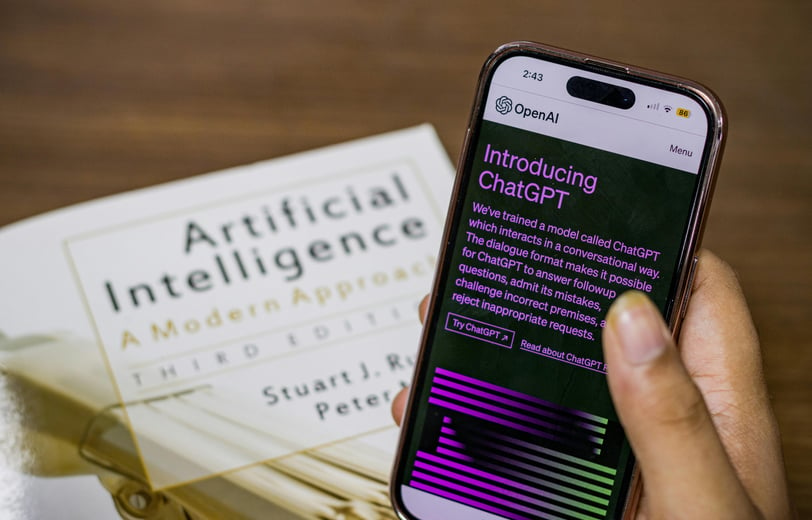Classroom Integration of ChatGPT: Bridging AI Support and Higher-Order Learning in Education
Blog post description.
QUANTITATIVE AND QUALITATIVE RESEARCH
Realyn Manalo
5/27/20253 min read


The rise of generative AI tools such as ChatGPT has reshaped the digital learning environment, prompting debates on their role in formal education. While many educators praise these tools for their accessibility, responsiveness, and potential to assist with writing and research, concerns remain about their limitations in fostering deep understanding and critical thinking. Students and teachers alike are navigating how best to integrate ChatGPT into daily learning without undermining academic integrity or the development of higher-order cognitive skills. As educational institutions explore AI-powered instruction, there is a pressing need to investigate how classroom use of ChatGPT affects both teaching practices and student outcomes—especially in the context of creativity, evaluation, and applied problem-solving.
Who Can Use These Topics
This research is ideal for students and professionals pursuing the following courses or strands:
College Programs:
Bachelor of Secondary Education (BSED)
Bachelor of Elementary Education (BEED)
Psychology
BS Information Technology
BA Communication
Senior High School Strands:
Humanities and Social Sciences (HUMSS)
Science, Technology, Engineering, and Mathematics (STEM)
General Academic Strand (GAS)
Why This Topic Needs Research
Although current literature showcases the growing adoption of ChatGPT in education, substantial research gaps remain:
Limited support for higher-order learning: While Hashemi and Kashefi (2025) demonstrated ChatGPT’s competence in lower-level math tasks, they also found it struggled with evaluating and creating, leaving a gap in understanding how AI can be improved for advanced conceptual learning.
Institution-level views over classroom experience: García-López et al. (2025) offered strategic insights into AI implementation, but their review lacked classroom-level observations and failed to capture real-time adaptation by teachers and students.
Few studies on behavioral engagement: Although Allam et al. (2025) promoted ChatGPT's potential in writing and feedback, their analysis did not track how it influences actual learner behaviors or long-term classroom engagement.
Unexplored ethical pedagogy: Sain and Loupias (2025) highlighted ethical concerns around plagiarism and over-reliance but did not assess whether structured guidelines or educator interventions can change students’ attitudes and behavior.
No outcome-based analysis for teaching: David and Maroma (2025) found pre-service teachers benefit from using ChatGPT in planning, but they did not investigate how this translates into student learning outcomes, leaving teaching effectiveness unverified.
Lack of sustained implementation data: Basilio (2023) captured teachers’ perspectives but did not measure the classroom impact of ChatGPT over time, leaving its practical integration effects underexplored.
Limited generalizability: Amorin and Gallaron (2025) linked ChatGPT use to improved academic performance via motivation but used self-reported data from a single site, highlighting the need for observational and multi-site validation.
Feasibility & Challenges by Target Group
Get Your Free Thesis Title
Finding a well-structured quantitative research topic can be challenging, but I am here to assist you.
✔ Expertly Curated Topics – Not AI-generated, but carefully developed based on existing academic studies and research trends.
✔ Comprehensive Research Support – Includes an existed and updated research gaps, explanation of variables as well as SDG relevance.
✔ Personalized for Your Field – Get a thesis title tailored to your academic requirements and research interests.
Prefer video content? Subscribe to my YouTube Channel for expert insights on research topics, methodologies, and academic writing strategies.
References
Allam, H., Dempere, J., Lazaros, E., Davison, C., Kalota, F., & Hua, D. (2025, February). Unleashing Educational Potential: Integrating ChatGPT in the Classroom. In HCT International General Education Conference (HCTIGEC 2024) (pp. 164-173). Atlantis Press.
Amorin, R. B., & Gallaron, G. M. (2025). The Mediating Effect Of Learning Motivation On Attitudes Towards Using ChatGPT (ATUC) As Educational Resource And Academic Performance: Evidence From A State University In Iloilo, Philippines. MIER Journal of Educational Studies Trends and Practices, 214-239.
BASILIO, M. B. (2023). Teachers' Perspectives on the Integration of Chat GPT in Classroom Teaching and Learning August 2023.
David, R. M. T., & Maroma, A. P. (2025). Exploring the Integration of ChatGPT in Pre-Service Teacher Education: Benefits, Challenges and Pedagogical Implications. International Journal of Multidisciplinary: Applied Business and Education Research, 6(3), 1333-1342.
García-López, I. M., González, C. S. G., Ramírez-Montoya, M. S., & Molina-Espinosa, J. M. (2025). Challenges of implementing ChatGPT on education: Systematic literature review. International Journal of Educational Research Open, 8, 100401.
Hashemi, N., & Kashefi, H. (2025). Using ChatGPT in teaching integral concepts: opportunities and challenges. Mathematics and Society, 9(4), 1-22.
Sain, Z. H., & Loupias, H. H. (2025, February). ANALYZING CHATGPT INTEGRATION IN HIGHER EDUCATION: USAGE TRENDS, STUDENT INSIGHTS, AND ETHICAL CONSIDERATIONS. In The Fourth International Conference on Government Education Management and Tourism (Vol. 4, pp. 036-036).
